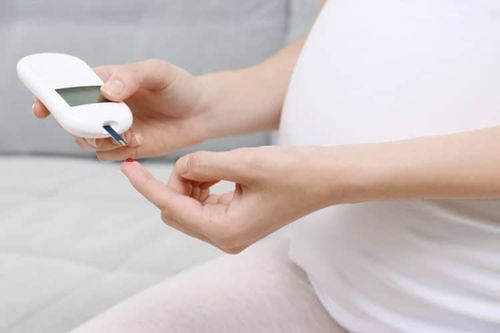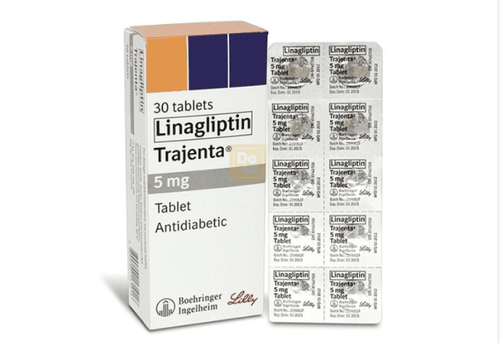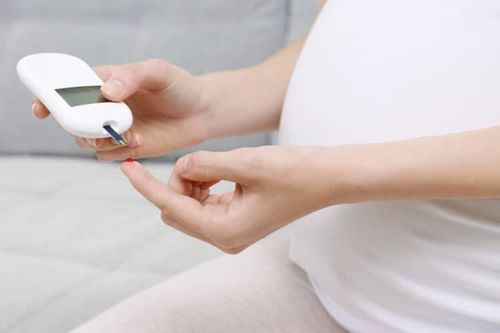This is an automatically translated article.
The article was professionally consulted by Doctor Nguyen Thi Hong On - Department of Obstetrics and Gynecology, Vinmec Phu Quoc International General Hospital.Today, the rate of pregnant women with gestational diabetes is increasing. If not diagnosed in time, gestational diabetes can cause many dangerous complications such as visceral enlargement, stillbirth, increased obstetric complications, and even death. So when can gestational diabetes be screened? The above concerns of pregnant mothers will be answered in the article below.
1. Why is it important to screen for gestational diabetes?
Gestational diabetes (or gestational diabetes) is a term for “any degree of impaired glucose tolerance with onset first identified during pregnancy”. This concept should be distinguished from those who have pre-existing diabetes and are planning or pregnant.If not detected and treated early, gestational diabetes will cause many complications for pregnancy and labor, as well as affect the health of both mother and baby in the future. Dangerous complications of gestational diabetes include: Risk of hypertension, edema of the limbs, preeclampsia, urinary tract infections... in the mother. Risk of birth defects, neonatal jaundice, hypoglycemia, polycythemia vera, obesity... in newborns.
Subjects at high risk of gestational diabetes:
Family with diabetes in previous gestational diabetes History of giving birth to a large baby (> 4000gr) History of stillbirth (especially in the last three months), birth defects Having ≥ 3 miscarriages in a row.
Trắc nghiệm: Chỉ số tiểu đường thai kỳ nguy hiểm như thế nào đối với thai nhi?
Không chỉ ảnh hưởng xấu đến sức khỏe người mẹ, tiểu đường thai kỳ còn gây nguy hại đến sự phát triển của thai nhi. Cùng làm bài trắc nghiệm sau đây để hiểu rõ hơn về sự ảnh hưởng của tiểu đường thai kỳ đối với thai nhi như thế nào nhé!The following content is prepared under supervision of Bác sĩ chuyên khoa I, Lê Hồng Liên , Sản phụ khoa , Khoa Sản phụ khoa - Bệnh viện Đa khoa Quốc tế Vinmec Central Park
2. When to get tested for gestational diabetes?
Because of the terrible consequences that gestational diabetes causes, screening for gestational diabetes is extremely necessary. Advice for women who are about to become pregnant or pregnant women need to pay attention to the time of screening that is suitable for themselves.Right from the first prenatal visit: pregnant women will be assessed by an obstetrician for risk. Pregnant women with no risk factors: Fasting blood glucose test. If the results are abnormal (greater than 92 mg/dL), screening should be done with a glucose tolerance test at 24 to 28 weeks' gestation. Pregnant women with risk factors: Perform screening with a glucose tolerance test during the first prenatal visit or during the first 3 months. Even if the results are normal, the test should be repeated between 24 and 28 weeks of pregnancy. The recommended timing is during the 24th to 28th week of pregnancy, because this is when the placenta is most fully developed, increased production of hormones that stimulate glucagon secretion, insulin resistance, decreased storage and increased lysis glycogen to glucose in the liver, reducing glucose tolerance in peripheral tissues. The result is an increase in blood sugar.
3. Screening process for gestational diabetes

The test is usually done in the morning without eating or after fasting for at least 8 hours (but not more than 12 hours). Pregnant women will be told three days before to still eat a starchy diet as usual.
First, the technician will take a blood sample to determine the fasting blood sugar. Then, the woman was instructed to drink 200ml of water mixed with 75g of glucose for 3 to 5 minutes. In addition, do not smoke, eat, drink soft drinks or exercise vigorously during this time. After 1-2 hours, two more blood samples will be taken to measure blood sugar.
Normal result is blood sugar:
Fasting: less than 92 mg/dL (5.1 mmol/L), 1 hour after test is less than 180 mg/dL (10 mmol/L) After 2 hours is less than 153 mg/dL (8.5 mmol/L). Gestational diabetes was defined if two or more blood samples were equal or higher than the upper limit. If there is only one pattern, it is called impaired glucose tolerance in pregnancy.
During the second trimester, pregnant women not only face a high risk of diabetes, but also many other health problems. So, in addition to performing a blood sugar test. Pregnant women need to carry out screening for fetal malformations, gestational diabetes, mother's weight and signs of early delivery to take appropriate measures to maintain pregnancy.
To protect mother and baby during pregnancy, Vinmec International General Hospital provides a comprehensive maternity service to monitor the health status of mother and baby comprehensively, and periodically check with obstetricians and gynecologists. This is very important because in the second trimester, doctors can detect fetal abnormalities very early that cannot be accurately diagnosed before such as heart defects, brain defects, cleft palate, cleft lip,.... At Vinmec, the strong ability in diagnostic imaging and fetal medicine intervention has helped many couples have healthy babies.
Please dial HOTLINE for more information or register for an appointment HERE. Download MyVinmec app to make appointments faster and to manage your bookings easily.














